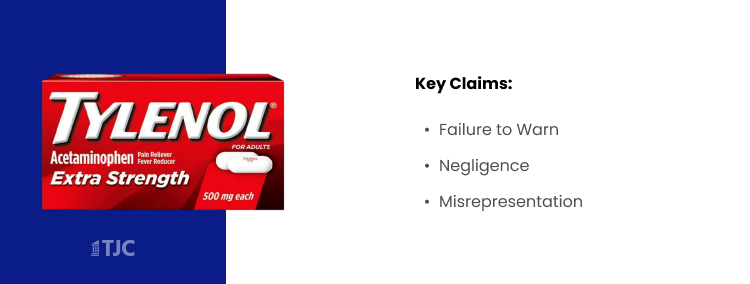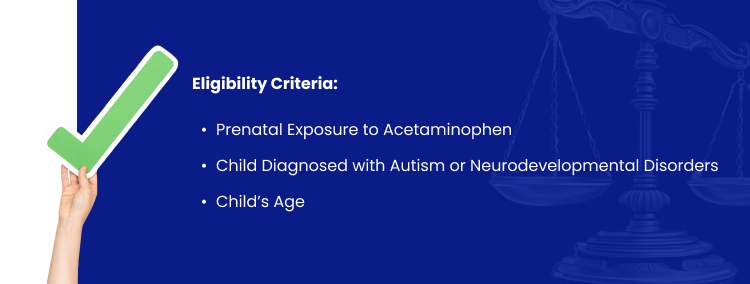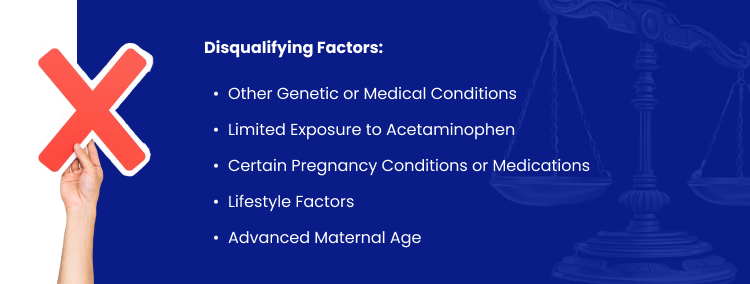The Tylenol lawsuit is a growing legal battle that has captured public attention due to concerns linking the widely used over-the-counter painkiller, acetaminophen, to developmental disorders, particularly autism spectrum disorder (ASD) and attention deficit hyperactivity disorder (ADHD).
At the heart of these claims is the possibility that prenatal exposure to acetaminophen, the active ingredient in Tylenol and other pain relievers, may be a contributing factor in the development of these neurodevelopmental disorders.
- Lawsuit Status: Over 400 federal cases are consolidated into MDL No. 3043 in the Southern District of New York, alleging acetaminophen use during pregnancy causes autism and ADHD. Settlements are pending as of late 2024.
- Who Can File: Parents who took Tylenol or generic acetaminophen during pregnancy and have a child diagnosed with autism or ADHD may file a lawsuit.
- Estimated Time: Lawsuits may take 2 to 5 years to resolve, with potential settlements expected by 2026.
- Settlement Amounts: Settlements typically range from $50,000 to $300,000, with severe cases exceeding $500,000.
- Companies Involved: Defendants include Johnson & Johnson and retailers like Walmart, CVS, Walgreens, and Costco.
Tylenol Lawsuit Updates
The Tylenol autism lawsuits have progressed through several key stages, beginning with scientific research and legal groundwork that laid the foundation for the current litigation. Below is a chronological summary of significant events leading to and during the lawsuits.
2020-2024 – Scientific Studies and Media Attention
The media has played a significant role in raising awareness about the potential risks of acetaminophen use during pregnancy.
Studies published in journals like the International Journal of Epidemiology and others have fueled public concern, with some medical professionals calling for more research and warnings about prenatal acetaminophen exposure.
2021 – Formation of the Tylenol Autism MDL
The Tylenol autism MDL was officially created in 2021 to handle the growing number of lawsuits filed against Johnson & Johnson and other acetaminophen manufacturers. The MDL helped consolidate these cases, making it easier for plaintiffs to manage the legal process and for the court to oversee discovery and motions.
2019 – Johns Hopkins Study and Lawsuit Filings
In November 2019, a major study by Johns Hopkins University was published in JAMA Psychiatry. It found that children with higher levels of acetaminophen in their umbilical cord blood had significantly increased risks of ASD and ADHD.
This study prompted the filing of the first Tylenol autism lawsuit as families began seeking accountability for the alleged harm caused by acetaminophen exposure.
2017 – Increased Public Awareness
In 2017, the issue gained more public attention when several media outlets reported on the potential dangers of acetaminophen use during pregnancy. Advocacy groups began pushing for clearer warnings on acetaminophen products.
2016 – Growing Evidence of Autism Link
A 2016 study published in JAMA Pediatrics indicated a possible link between acetaminophen use in pregnancy and an increased risk of autism spectrum disorder (ASD). The findings added weight to concerns about the safety of acetaminophen and prompted calls for further investigation.
2014 – Further Research on Neurodevelopmental Risks
In 2014, a study published in the journal Pediatrics identified an association between acetaminophen use during pregnancy and an increased risk of attention deficit hyperactivity disorder (ADHD) and other behavioral problems. This study laid important groundwork for future research linking acetaminophen to neurodevelopmental disorders.
2008 – First Studies Indicating Possible Risks
A 2008 study published in the International Journal of Epidemiology suggested that children whose mothers used acetaminophen during pregnancy showed higher rates of behavioral issues. This early research sparked interest in investigating acetaminophen’s potential effects on fetal development.
Early 2000s – Initial Concerns and Research
In the early 2000s, concerns began to emerge about the safety of acetaminophen during pregnancy. Researchers started examining potential links between acetaminophen and neurodevelopmental outcomes, though findings were still inconclusive.
Tylenol and Autism Spectrum Disorder
Concerns about a potential link between Tylenol and autism spectrum disorder arose after several studies indicated that acetaminophen use during pregnancy might impact fetal brain development. These findings have sparked public attention and ongoing debate.
Key Studies and Findings
- MDPI Behavioral Sciences Study (2020):
This review analyzed data from multiple studies and found consistent associations between maternal acetaminophen use and a 20-30% increased risk of neurodevelopmental disorders like ASD and ADHD. The study highlighted the need for more precise research to clarify the connection. - American Journal of Epidemiology Study (2018):
Researchers at the University of Barcelona reported that children exposed to acetaminophen during pregnancy showed a 30% higher likelihood of developing ASD. The study suggested that acetaminophen might disrupt hormonal processes vital for brain development. - Johns Hopkins Follow-Up Analysis:
Johns Hopkins researchers noted that even moderate use of acetaminophen during pregnancy was linked to a statistically significant increase in neurodevelopmental risks. Their study associated higher acetaminophen levels in newborns with up to three times the risk of autism and ADHD.
Public Attention and Debate
These studies have led to widespread concern due to the common use of acetaminophen by pregnant women. While some experts argue for precautionary guidelines, others stress that the findings are correlational, not causal.
The lack of consensus has fueled ongoing debates, regulatory reviews, and the current Tylenol autism lawsuits, seeking clearer manufacturers’ warnings and accountability.
Tylenol Autism Lawsuit: Legal Context
Below are details on the plaintiffs, defendants, key legal representatives, and significant court jurisdictions.
Plaintiffs
The plaintiffs in the Tylenol autism lawsuits are primarily parents and legal guardians who allege that their children developed ASD, ADHD, or other neurodevelopmental disorders due to the use of Tylenol or other acetaminophen-containing medications during pregnancy.
These individuals claim that they were not adequately warned of the potential risks associated with using these medications and are seeking compensation for medical costs, therapy, pain and suffering, and future care expenses.
Defendants
The primary defendant in these lawsuits is Johnson & Johnson, the manufacturer of Tylenol. In addition, major retailers and pharmacies that sold acetaminophen-based products, including Walmart, CVS, Walgreens, and Costco, have also been named as defendants.
These companies are accused of failing to provide sufficient warnings on the product labels regarding the potential risks associated with acetaminophen use during pregnancy.
Significant Court Jurisdictions:
The lawsuits have been consolidated into a multidistrict litigation (MDL) in the U.S. District Court for the Southern District of New York. Judge Denise Cote, the presiding judge, oversees the pretrial proceedings, which include motions, discovery, and expert testimonies.
The MDL process aims to streamline the handling of hundreds of similar lawsuits, ensuring that pretrial matters are managed efficiently before individual cases are sent back to their original jurisdictions for trial.
In addition to the MDL, some individual lawsuits are being filed in various state courts across the United States. If these cases do not meet the criteria for inclusion in the MDL, they may proceed separately.
Legal Basis
The Tylenol autism lawsuits claim that manufacturers, including Johnson & Johnson, failed to warn consumers about potential risks associated with taking Tylenol during pregnancy.
Plaintiffs allege that manufacturers were aware, or should have been aware, of studies suggesting a link between acetaminophen use and an increased risk of ASD and ADHD but did not provide adequate warnings.
- Failure to Warn: Plaintiffs claim that Tylenol manufacturers did not provide adequate warnings on their product labels about the potential risks associated with acetaminophen use during pregnancy. They argue that if these risks were disclosed, pregnant women may have chosen alternative pain relief options.
- Negligence: The lawsuits assert that manufacturers were negligent in their duty to ensure the safety of their products. This includes allegations that the companies failed to conduct proper safety testing or monitor emerging scientific evidence.
- Misrepresentation: Plaintiffs allege that manufacturers marketed acetaminophen as safe for use during pregnancy despite growing evidence of potential harm to fetal brain development.
Scientific Evidence and Controversy
Several studies have examined the potential link between Tylenol use during pregnancy and an increased risk of ASD and ADHD in children:
NIH-Funded Study (2019)
Researchers from the National Institutes of Health (NIH) analyzed umbilical cord blood from 996 births in the Boston Birth Cohort. The study found that children with the highest levels of acetaminophen in their cord blood were:
- 2.86 times more likely to develop ADHD.
- 3.62 times more likely to be diagnosed with ASD.
Systematic Review (2022)
A systematic review published in Cureus evaluated 16 high-quality studies investigating maternal acetaminophen use and neurodevelopmental outcomes.
The review concluded that prolonged or high-dose use during pregnancy was consistently associated with an increased risk of ASD, ADHD, and other neurodevelopmental challenges.
While these studies suggest a potential link, the evidence remains controversial. Critics argue that the data is correlational rather than causal, meaning other factors could explain the association. Possible confounding factors include:
- Maternal health conditions like infections or fever.
- Genetic predispositions to neurodevelopmental disorders.
- Environmental influences are not accounted for in studies.
In 2023, in the Tylenol autism MDL, a federal judge dismissed some expert testimonies, citing methodological flaws and the lack of definitive proof linking acetaminophen to autism and ADHD.
Regulatory Perspectives
Regulatory agencies like the FDA currently maintain that acetaminophen, the active ingredient in Tylenol, is generally safe for use during pregnancy when taken as directed.
The FDA has reviewed existing studies and concluded that the evidence linking prenatal tylenol exposure to ASD and ADHD is inconclusive. While some research suggests a potential association, the FDA has not issued new warnings or restrictions for pregnant women.
Despite the FDA’s stance, many scientists and healthcare professionals have called for more rigorous studies and clearer guidelines. If stronger evidence emerges, these ongoing concerns may lead to changes in future labeling or usage recommendations.
Other international regulatory bodies, like the European Medicines Agency (EMA) and the World Health Organization (WHO), have taken similar positions, emphasizing responsible use during pregnancy.
Do You Qualify for a Tylenol Autism Lawsuit?
If you are considering filing a Tylenol autism lawsuit, it’s important to determine whether you meet the eligibility criteria. Below, we outline the key factors determining whether you qualify to pursue a Tylenol autism claim and some factors that may disqualify you from filing.
Eligibility Criteria
You may be eligible to file a Tylenol autism lawsuit if you meet the following conditions:
Prenatal Exposure to Acetaminophen:
- You took Tylenol or any medication containing acetaminophen (including generic acetaminophen) during your pregnancy, especially during the first and second trimesters when fetal brain development is most sensitive.
- The acetaminophen was used for common pregnancy-related issues, such as pain relief or fever reduction.
Child Diagnosed with Autism or Neurodevelopmental Disorders:
- Your child was diagnosed with autism spectrum disorder (ASD), ADHD, or another neurodevelopmental disorder (such as language delays or learning disabilities).
- A qualified healthcare professional must have made the diagnosis, and the condition must be documented in medical records.
Child’s Age:
- Your child must be 17 years of age or younger. This is because the lawsuit involves the potential effects of prenatal tylenol exposure on children’s neurodevelopment, and claims typically focus on conditions that manifest in early childhood.
Disqualifying Factors
While many parents may believe they have a valid claim, several factors can disqualify you from filing a Tylenol autism lawsuit:
Other Genetic or Medical Conditions:
- If your child has been diagnosed with conditions such as Down syndrome, Fragile X syndrome, Tourette syndrome, or tuberous sclerosis, it may be more difficult to prove that acetaminophen caused the neurodevelopmental disorder.
Limited Exposure to Acetaminophen:
- If you took fewer than 10 doses of Tylenol or acetaminophen during your pregnancy, it may be challenging to establish a strong link between the exposure and your child’s condition.
- This threshold helps demonstrate that the exposure was significant enough to affect brain development possibly.
Certain Pregnancy Conditions or Medications:
- If you experienced gestational diabetes, gestational hypertension, or had an infection or fever during your pregnancy that required hospitalization, it could complicate the cause of your child’s condition.
- Medical conditions during pregnancy are often linked to an increased risk of neurodevelopmental disorders, making it harder to attribute the child’s condition solely to acetaminophen exposure.
- Also, if you took SSRI antidepressants or other medications during pregnancy, this could potentially be another factor that complicates the link between acetaminophen and the child’s disorder.
Lifestyle Factors:
- If you consumed alcohol, tobacco, or illegal drugs during pregnancy, it may be difficult to prove that acetaminophen exposure was the cause of the condition, especially if other environmental or behavioral factors played a more significant role in the child’s development.
Advanced Maternal Age:
- Women over the age of 39 at the time of birth may face additional scrutiny in their case, as advanced maternal age is associated with an increased risk of certain genetic conditions and neurodevelopmental disorders.
Importance of Legal Guidance
Filing a Tylenol autism claim involves complex legal and scientific considerations. If you believe you meet the eligibility criteria, you must seek the help of Tylenol autism lawyers specializing in product liability and mass tort cases.
An experienced lawyer will help you navigate the legal process, gather the necessary medical records and evidence, and assess whether you have a strong case.
When Will The Tylenol Autism Lawsuit Be Settled?
The Tylenol autism lawsuits are still in progress, with many cases consolidated in the Tylenol autism MDL in federal court.
Several factors, including the complexity of the scientific evidence, the number of claims, and ongoing settlement negotiations, influence the road to settlement.
Current Status
The lawsuits are in their early stages, with significant legal proceedings such as discovery, motions, and court rulings still unfolding.
Some cases have already been dismissed, but many are still active, with plaintiffs fighting to prove the link between acetaminophen exposure during pregnancy.
Dismissed Cases
While a number of Tylenol autism claims have been dismissed—often due to legal challenges or issues with evidence—many cases remain in litigation.
The dismissal of some lawsuits does not necessarily signal the end of all claims, as the legal team continues to evaluate the merits of each case.
Potential Settlement Amounts
The average payout for a Tylenol autism lawsuit is estimated to range between $50,000 and $300,000.
The exact amount can vary based on factors such as the severity of the child’s condition, the cost of medical care, and the strength of the evidence
- Estimated Time to Settlement: While there is a possibility that the Tylenol autism MDL could be resolved as early as 2024, the complexity of the litigation means it could take longer. As new studies and legal rulings continue to emerge, both sides may extend their negotiations.
With so many factors at play, predicting the exact timeline for a resolution is challenging. However, new warning labels on
acetaminophen medications and potential changes in labeling practices could happen sooner as health agencies such as the FDA review the evidence.
Conclusion
The Tylenol lawsuits highlight ongoing concerns about the potential connection between acetaminophen use during pregnancy and neurodevelopmental disorders like autism spectrum disorder and attention deficit hyperactivity disorder.
With lawsuits consolidated in multidistrict litigation, courts still evaluate the evidence, and outcomes remain uncertain. Some families pursue individual claims, while others consider the benefits of a Tylenol class action lawsuit.
Given the complexity of these cases, staying informed about the latest developments is essential.
As new research and court decisions shape the future of these acetaminophen autism lawsuits, consulting experienced legal professionals can help you understand your options and pursue justice effectively.
Disclaimer: The information provided in this article is for informational purposes only and does not constitute legal advice. Readers should consult with a licensed attorney for legal guidance regarding their specific situation. The content is not intended to create, and receipt of it does not constitute an attorney-client relationship.




